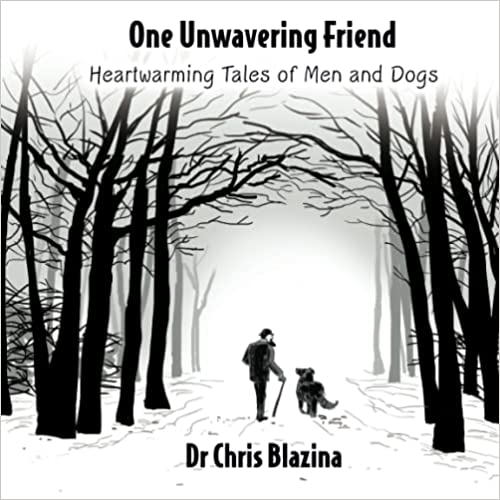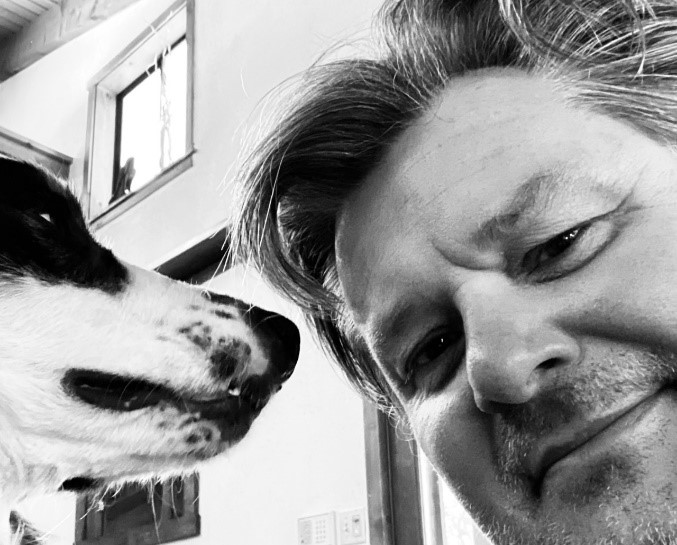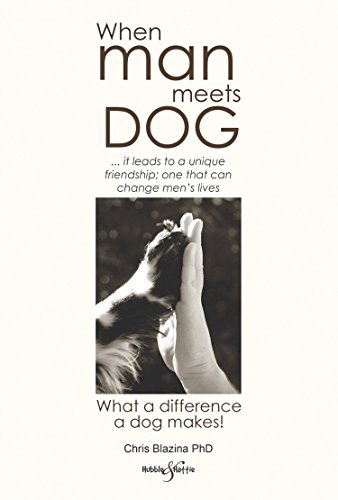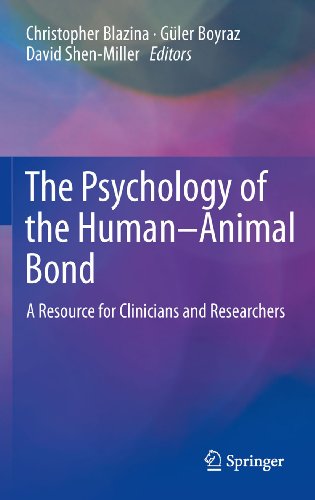
LISA DART – SURVIVAL POETRY AND THE VOICES OF EXPERIENCE
I interviewed Lisa Dart, finalist in the Grolier, Aesthetica and Troubadour Poetry Prizes and author of The Linguistics of Light (poems, Salt, 2008), Fathom (prose


I interviewed professor and psychologist Chris Blazina about the bond between people and animals. Chris is an award-winning author of eight books who has been interviewed on more than 100 radio programs and featured in magazines such as Men’s Journal and Women’s Health. His book, When Man Meets Dog is the Winner of the National Indie Excellence Book Awards – Men’s Health.
Chris says: “…dogs seem to have a unique ability to reach many of us, offering a tutorial about what it means to be in a real loving connection.”
Leslie: Can you describe some incidents or stories that illustrate what we mean by ‘Companion Animal Issues’? How can they be addressed?
Chris: Companion animal or animal companion is a recent term(s) referring to experiencing non-human animals (e.g., dogs, cat, horses, etc.) as close friends or family. The research suggests in North America 85-90% of people regard their dogs in this way. While animal companion is a recent term, our bond has very old roots. It is believed that our connection goes back 20,000- 60,000 years. Dogs being the first friend, in terms of domesticated animals. The fire circle theory is that over time wolf-dogs (the forerunner to modern dogs) slowly moved closer to the human community. A type of reciprocal relationship grew deeper over time.
There have also been developments over the past 150 years or more that showcase our special bond. We can see how the establishment of 19th century humane societies in the UK and US began advocating for better more ethical treatment of animals. We were slowly growing out of the mindset that there was such a sharp divide between human and non-human animals. Naturalist Charles Darwin advocated for the recognition that the two “differ in degree not in kind” along important dimensions like the expression of emotions. With the advent of the Industrial Revolution, dogs also became a type of bridge back to our connection with the natural world even amid growing urban pressures.

In recent decades, social science has advocated for the special psychological and physical effects of being in the presence of animals. Some refer to this as the pet effect. It can include decreases in anxiety and stress hormones, drop in blood pressure, and reregulating our nervous system as many recover from the everyday wear and tear of life. We are still trying to understand all that contributes to the pet effect. My guess it has a lot to do with the nature of any type of relationship that is beneficial in our lives. That includes having social support, a trusted presence we count upon, and the way dogs attune to our mood states in a way we feel listened to.
We see how the relational dynamics play out when dogs assist those with special needs. That includes seizure and migraine alert dogs. Or how animal companions help those with post-traumatic stress disorder (PTSD) navigate a world that does not feel safe. In these scenarios dogs recognize and respond to a human in distress. Their presence soothes us. Even the everyday dog person can resonate with how animal companions can attune to us on difficult days.
Our bond is also a unique type of relationship that offers an existential meaning and purpose. For some, one’s dog is the reason to get up in the morning and face the day. And if financial commitment reflects animal companions’ importance, we can see an ever-growing pet industry which exceeded 260 billion dollars in the US for 2022.
Taken together, we can see our bond with dogs is a long time in the making, evolving over time, to the present-day special status as a close friend or family member.
Leslie: What’s the origin of your interest in how men relate to dogs? How would you describe yourself on this spectrum of behaviour?
Chris: My life has been graced with many dogs going back to growing up in less than desirable family circumstances. My dog Scooby was the one that really taught me how to be with others in a caring way, starting when I was about five years old. I remember referencing our time together much later when I was in graduate school training to be a psychologist. What he taught me has become the way I try to be with others. I would say dogs have schooled me on many things including the art of loving. I see so often in my practice, that we love but we do not really know how to love. We falter with those we hold dear. But dogs seem to have a unique ability to reach many of us, offering a tutorial about what it means to be in a real loving connection.

Leslie: What makes men and dogs particularly suited to each other? And what are the key behaviour patterns that occur between them?
Chris: To be clear I don’t think the bond with dogs is the exclusive providence of any demographic. “Man’s best friend” does not mean males hold the exclusive rights. All the same, for many males that are socialized to be emotionally distant as a way of being a man, the bond with their dogs pulls for a more relational way of being. Parts of us that seem off limits or very uncomfortable to engage, are temporarily bypassed. Males get to dial into the hardwired need to connect when in the presence of their animal companions. They move beyond the usual defensiveness and social isolation. The hope is that same openness can be transferred to other important relationships with humans as well.
Leslie: In my experience some men find it difficult to commit to relationships with other human beings (particularly with women). How can relationships with dogs change this?
Chris: Like any important emotional attachment, meaningful bonds set the stage for building on what could be possible in many other types of relationships. So, whether we are talking about friends, family, one’s children or partner, really being in a more open relational space of connecting with any of these attachments helps us grow, becoming more capable social creatures.
Leslie: Globally, men outnumber women in terms of who gets heard, achieves fame/recognition, and directs the levers of power. What would you say to a critic who claimed your studies continue this unhealthy focus on the dominant sex?

Chris: It is a very important question; one I have been considering for some time. I think of the 20 years I worked as a psychology professor and the nearly 30 years as a practicing psychologist. And my own background of growing up in a blended working-class family from culturally different backgrounds. It is a delicate balance to talk about one’s unique perspective without coming across as disregarding other’s experiences. Psychologists refer to this as a form of ingroup versus out group mentality. My tribe against your tribe. In the extreme, that approach has a very fixed perception of if you are not like me, you are not just different but potentially dangerous, and surely not worth knowing. It is a very complex thing to simultaneously recognize an individual’s unique experiences that are sometimes quite painful and damaging and still making room for shared places of commonality as human beings. For me, there are universal themes like love and loss to which we can all relate even if some of the specifics of our experience are different. We would like others to understand and appreciate who we are and where we come from.
Our bond with animal companions is one of those variations on potentially universal themes. I am currently working on a book titled, The art of Loving which highlights how dogs help many rediscover and heal from prior attachment wounds with humans. My hope is it will be a way to discuss the universality of how we face love and loss with the help of our dogs. It speaks to our hardwired need to make and sustain our attachment bonds across the life span. For many of us that find our bonds with humans difficult we turn instead to animal companions to become family and friends. Or perhaps, what we learn from our dogs, cats, etc., becomes a way to bridge our human isolation that is so prevalent these days.
Next week, artist and writer Rose Ruane tells her creative life story.
ABOUT LESLIE TATE’S BOOKS:

I interviewed Lisa Dart, finalist in the Grolier, Aesthetica and Troubadour Poetry Prizes and author of The Linguistics of Light (poems, Salt, 2008), Fathom (prose

I interviewed writer Julia Lee Barclay-Morton about her experience of autism. Julia began as an experimental dramatist in New York, moving to the UK to

I interviewed Gillean McDougall from Glasgow, who edited the collaborative projects Honest Error (on Charles Rennie Mackintosh and his wife Margaret Macdonald) and Writing the

I interviewed French writer Delphine de Vigan, whose book, No et moi, won the prestigious Prix des libraires. Other books of hers have won a clutch

I interviewed Joanne Limburg whose poetry collection Feminismo was shortlisted for the Forward Prize for Best First Collection; another collection, Paraphernalia, was a Poetry Book Society Recommendation. Joanne
| Cookie | Duration | Description |
|---|---|---|
| cookielawinfo-checkbox-analytics | 11 months | This cookie is set by GDPR Cookie Consent plugin. The cookie is used to store the user consent for the cookies in the category "Analytics". |
| cookielawinfo-checkbox-functional | 11 months | The cookie is set by GDPR cookie consent to record the user consent for the cookies in the category "Functional". |
| cookielawinfo-checkbox-necessary | 11 months | This cookie is set by GDPR Cookie Consent plugin. The cookies is used to store the user consent for the cookies in the category "Necessary". |
| cookielawinfo-checkbox-others | 11 months | This cookie is set by GDPR Cookie Consent plugin. The cookie is used to store the user consent for the cookies in the category "Other. |
| cookielawinfo-checkbox-performance | 11 months | This cookie is set by GDPR Cookie Consent plugin. The cookie is used to store the user consent for the cookies in the category "Performance". |
| viewed_cookie_policy | 11 months | The cookie is set by the GDPR Cookie Consent plugin and is used to store whether or not user has consented to the use of cookies. It does not store any personal data. |